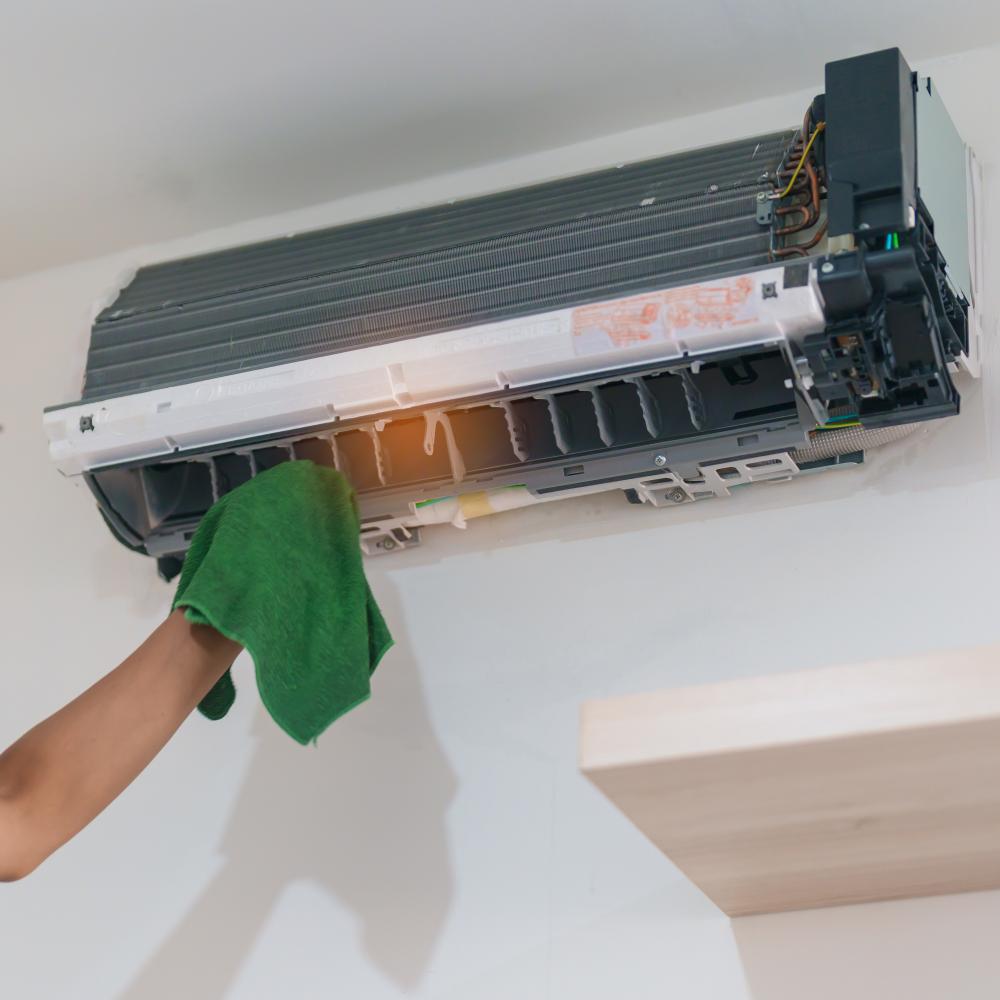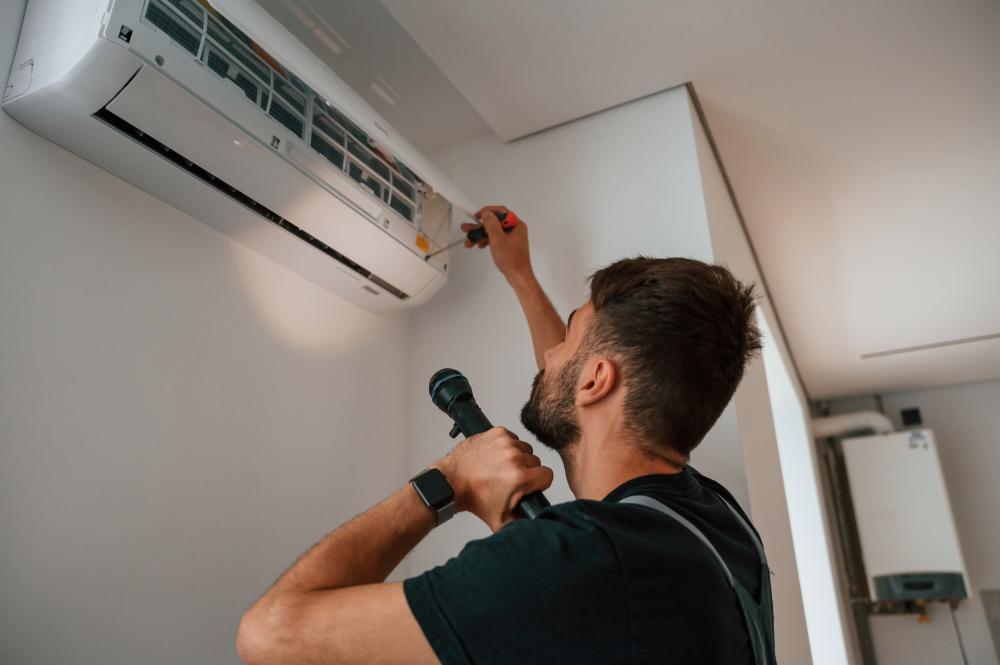How Residential AC Systems Function
Preventive Maintenance That Saves You Money
1. Replace Filters Regularly:
Dirty filters impede airflow and cause your system to work harder. Replace them every 1-3 months.
2. Inspect and Clean Coils:
Dust and debris can accumulate, reducing the coil’s ability to absorb heat. Ensure coils are cleaned annually.
3. Check Refrigerant Levels:
Low levels can indicate a leak, which requires immediate attention. Always have a professional handle refrigerants.
Common Issues and Effective Solutions
- Thermostat Failures: Sometimes, the issue isn’t with the AC but rather with the thermostat. Try replacing the batteries or recalibrating it.
- Sensor Problems: It’s crucial for the sensor near the evaporator coil to be in position. If it isn’t, your AC might behave erratically.
- Drainage Difficulties: Ensure your drainage pipes are clear of clogs and debris to prevent water damage and poor cooling performance.
What Qualifies as a Residential AC Repair Emergency?
Step-by-step Guidance for Emergencies:
- Check the thermostat settings first; they might have been accidentally changed.
- Ensure the breaker hasn’t tripped; reset if necessary.
- If both are in order, call a professional immediately to diagnose and resolve the issue.
The Future of Residential AC Repair

What is the $5000 AC rule?
The $5000 rule is a handy guideline for deciding whether to repair or replace your air conditioning unit. It suggests multiplying the cost of a repair by the age of the AC unit in years. If the result is greater than $5000, it might be more cost-effective to replace the unit instead of repairing it. For example, if you have a 10-year-old AC unit needing a $600 repair, multiplying 10 by 600 gives you $6000, which exceeds the $5000 threshold, indicating that replacement may be the better option.
This rule is quite useful because it factors in the diminishing efficiency and increased likelihood of further issues with older units. However, remember that it’s just a guideline and other factors like energy efficiency, frequency of past repairs, and technological advancements should also play a role in your decision-making. Have you encountered this rule, and how did it influence your AC maintenance decisions?
What is the life expectancy of a home air conditioner?
Typically, a home air conditioner can last between 15 to 20 years, though this can vary based on several factors like maintenance, usage, environmental conditions, and the brand. Regular maintenance, such as changing filters and cleaning coils, significantly boosts the AC’s longevity. One of our clients in Lagos had an AC unit running efficiently for 22 years, thanks to its consistent upkeep.
It’s important to consult with professionals about the condition of your system, especially if it’s nearing the end of its expected life. Considering an upgrade to a more energy-efficient model might also be a wise choice for long-term savings. When do you plan to upgrade your system?
Is it cheaper to repair or replace an AC unit?
The cost-effectiveness of repairing versus replacing an AC unit largely depends on several factors, including the age of the unit, the nature of the malfunction, and the potential for future repairs. If you encounter frequent breakdowns, escalating repair costs, or your unit is over 15 years old, replacement is often the more economical choice. Investing in a new energy-efficient unit can lead to considerable savings in energy costs over time.
It can be insightful to look at long-term efficiency rather than just upfront costs. Replacement can reduce overall expenses and enhance comfort. What’s your experience in juggling repair costs versus replacement decisions?
Who should I call if my AC is not working?
If your AC stops working, it’s critical to contact a trusted and qualified AC repair service immediately. At UpObi, we pride ourselves on quick response times and efficient solutions. Our technicians are skilled at diagnosing issues and providing fast resolutions, ensuring minimal disruption to your comfort.
Before calling for service, you might check the thermostat settings and ensure the breaker hasn’t tripped. These simple checks could save you a service visit. Do you have a go-to service provider for AC issues?
Why is preventive maintenance crucial for my AC?
Preventive maintenance is essential because it not only extends the lifespan of your AC system but also improves its efficiency. Regular tasks such as changing filters, cleaning coils, and inspecting refrigerant levels help prevent common issues and costly repairs. I’ve seen systems running efficiently for over a decade simply due to regular maintenance.
Adopting a consistent maintenance schedule is a wise investment. It keeps energy consumption in check, ensuring your home or business remains comfortable year-round. Are you currently following a maintenance schedule?
How does emerging technology impact residential AC repair?
Emerging technology, like smart thermostats and IoT-enabled devices, is revolutionizing residential AC repair. These advancements allow for predictive maintenance alerts, helping to identify and resolve issues before they become emergencies. At UpObi, we are integrating these technologies to enhance service delivery and system reliability for our clients.
Such technologies not only improve comfort and efficiency but also offer insights into energy consumption, paving the way for smarter and more sustainable living. Have you embraced any of these high-tech solutions in your home or business?
Resources
- U.S. Department of Energy – The official website of the U.S. Department of Energy providing information on energy efficiency and home cooling systems.
- U.S. Environmental Protection Agency – The official website of the EPA offering resources on air quality, energy efficiency, and environmental protection.
- Consumer Reports – A nonprofit organization providing product testing and ratings to help consumers make informed decisions about their purchases.
- ENERGY STAR – A program by the U.S. Environmental Protection Agency and the U.S. Department of Energy promoting energy efficiency through certification and information on products.
